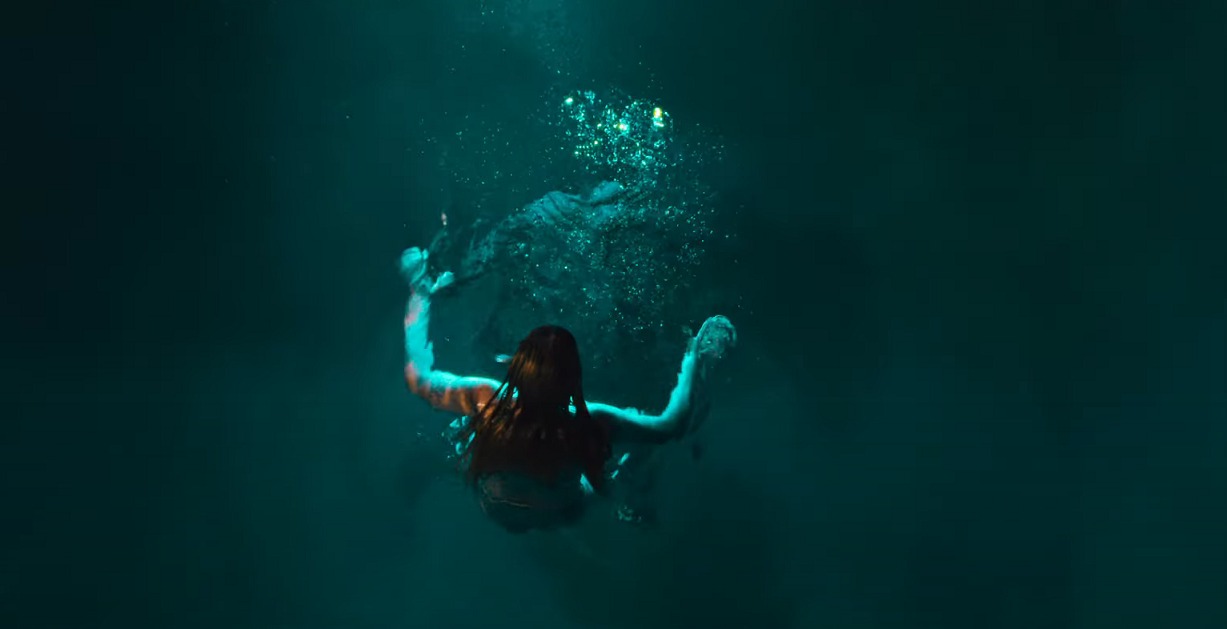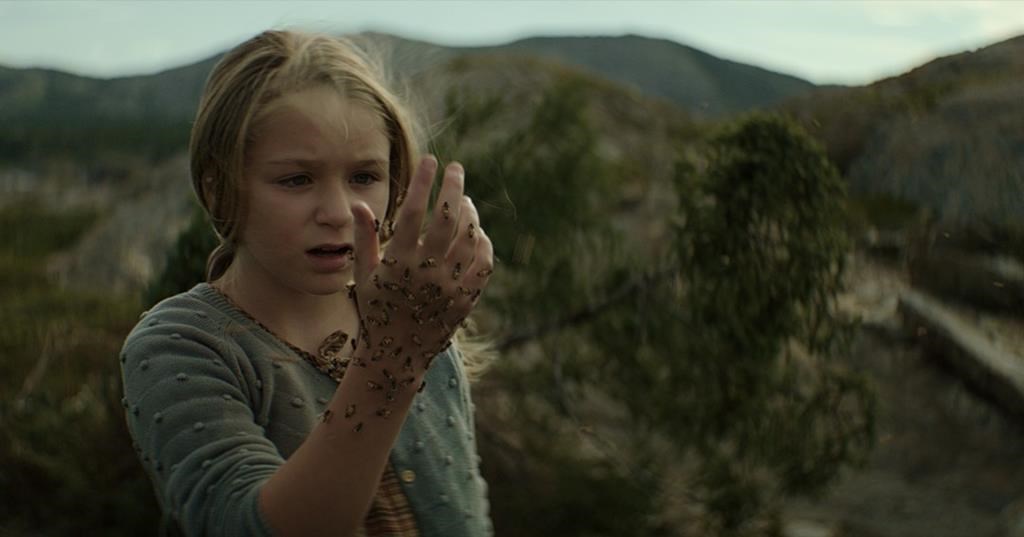Reviews
‘Night Swim’ Review – High Concept Swimming Pool Horror Movie Struggles to Stay Afloat

Expanding a horror short to feature length is tricky work, particularly when the short in question gets straight to the scares. Writer/Director Bryce McGuire’s 2014 short Night Swim, a collaboration with Rod Blackhurst, cut straight to the horror to exploit everyone’s worst fears about swimming pools. Almost a full decade later, McGuire’s feature expansion showcases more ways to mine terror from the aquatic concept, buoyed by a great cast, but a familiar formula and simplified mythology threaten to sink it all.
After a cold open demonstrates the dangers of the film’s haunted location, a seemingly benign anywhere America backyard pool, Night Swim introduces the ill-fated family destined to discover the supernatural treachery awaiting them. The Waller family are at the beginning of a new chapter in their lives; a recent degenerative illness diagnosis cut a professional baseball career short for dad Ray Waller (Wyatt Russell). As Ray struggles with not just his functional health but concepts of identity without his beloved sport, it’s up to his wife Eve (Kerry Condon) to care for him and, frequently, act as the bridge between dad and children Izzy (Amélie Hoeferle) and Elliot (Gavin Warren). Eve’s years of sacrifice to Ray’s career continue when they purchase a home with a pool ideal for Ray’s physical therapy. Only the Wallers’ dreams of a better life get derailed by supernatural occurrences that mean the family harm.

(from lower left) Izzy Waller (Amélie Hoeferle), Elliot Waller (Gavin Warren), Kay (Nancy Lenehan), Ray Waller (Wyatt Russell) and Eve Waller (Kerry Condon) in Night Swim, directed by Bryce McGuire. © 2023 Universal Studios. All Rights Reserved.
It’s the family dynamics and the great cast that mostly keep McGuire’s feature afloat. Russell’s natural affability creates an easy foothold into the Waller family’s plight, with his illness putting more weight on Eve’s shoulders. Younger sibling Elliot desperately wants to make his athlete dad proud, but his interests and lack of coordination mean he struggles to connect. That doesn’t just contribute to the emotional stakes, but it’s a key relationship that underscores Eve’s keen talent for observation.
Condon leans into Eve’s maternal instincts, ensuring a savvy horror heroine who makes smart choices at every turn. When the haunted swimming pool begins its machinations in earnest, Eve is the first to get suspicious. McGuire’s script ensures that it’s the sinister force at play that thwarts Eve’s attempts to protect her family and never a contrived character choice solely to propel the narrative forward. Thanks to Condon’s nuanced performance, Night Swim quickly becomes her movie.
Night Swim is also helped by cinematographer Charlie Sarroff (Relic, Smile), who captures the central antagonist- the pool- with a stunning clarity that makes the underwater sequences pop. As McGuire mines every facet, drain, and depth for the horror, it’s made more tactile by a commitment to practical effects. Fractured FX ensures that the ghosts that pop up to torment isolated swimmers are bloated and unsettling. Night Swim soars when it plunges its protagonists into inky black depths to confront unknown, impossible horrors.

Kerry Condon as Eve Waller in Night Swim, directed by Bryce McGuire.
Where it flounders is in the mythology and story itself. A strong concept gets Night Swim off to a solid start, supported by characters with rooting interest, but it quickly devolves into a series of haunted house tropes that recall more classic entries. The more Ray channels his inner George Lutz or Jack Torrance, the more contrived the high concept effort becomes. Or rather, more predictable. The explanation behind the pool’s paranormal activity also feels under-baked and underwhelming to the point of undermining what works. That McGuire gets a bit too conservative with the horror encounters and body count leaves the flaws more exposed.
Night Swim will likely work better as an entry point into the genre for newcomers unfamiliar with more prominent haunted house horror movies like The Amityville Horror or The Shining. Condon’s fierce yet heartfelt performance and the underwater sequences keep Night Swim treading water. Still, the high concept novelty of a haunted swimming pool will wear out its welcome quickly for seasoned horror fans who’ve seen this scenario play out so many times before.
Night Swim releases in theaters on January 5, 2024.


Reviews
‘The King Tide’: An Island Town Rots with Moral Decay in Canadian Folk Horror Fable [Review]

The opening scenes of director Christian Sparkes’ The King Tide set an ominous tone: a powerful storm takes down the power lines of a small island town as a pregnant woman loses her child while her dementia-suffering mother sits nearby. In the morning, as the town takes stock of the damage and the power is restored, a surprising discovery is found in an overturned boat in the harbour: a baby girl…with the ability to heal.
Writers Albert Shin and William Woods, working from a story by Kevin Coughlin and Ryan Grassby, treat the story as something of a morality tale mixed with a fable. Following the cold open, the action jumps ahead 10 years at a point when the unnamed island (the film was shot in Newfoundland, Canada) is thriving. The fishing is bountiful, the islanders are self-sufficient and have cut ties with the mainland, and most everyone is happy.
As characters are prone to saying, it’s all thanks to Isla (Alix West Lefler), the miracle baby who has grown up worshipped by the islanders. While Mayor Bobby Bentham (Clayne Crawford) and his wife Grace (Lara Jean Chorostecki) endeavor to raise Isla like any other little girl, the reality is that the island’s entire ecosystem revolves around her miraculous powers. It is only because of Isla that they survive; every aspect of their lives – from medicine to food – relies on her.
Each day the citizens line up for their allotted time with the young girl – be it to stave off breast cancer, like Charlotte (Kathryn Greenwood), or recover from another night of heavy drinking like former doctor, Beau (Aden Young). There’s even a predetermined schedule for when she will go out on the boats and use her power to lure fish into the nets.

One fateful day, Bobby succumbs to peer pressure and alters Isla’s schedule at the last minute to accompany cod fishermen Marlon (Michael Greyeyes) and Dillon (Ryan McDonald). A childish game with fatal consequences is played, but with Isla indisposed, a young boy, who would have otherwise been fine, dies. And while the rest of the community grieves, it is Isla who is completely shaken and, unexpectedly, loses her powers.
Suddenly the entire balance of the island is thrown off. Folks like Grace’s mother, Faye (Frances Fisher), who relied on Isla to keep her dementia at bay, suddenly reckon with mortality, while the food security of the town is called into question. Faye’s late-night “support group” meetings take on an urgent and secretive tone and the townspeople claim ownership of Isla’s time despite Bobby and Beau’s protests that she needs rest to recover from her trauma.
Like the best thrillers, the politics and personalities within the community come into play as morals are compromised and the good of individuals vs the collective is played out in increasingly desperate situations. The King Tide excels because it is interested in exploring the competing motivations of the townspeople, while also resolutely refusing to paint anyone as inherently good or bad. These are desperate people, determined to remain independent and free from outside interference, while protecting their trapped-in-amber way of life.

These developments work because there’s a humanity to the characters and The King Tide wisely relies heavily on its deep bench castoff character actors to drive the conflict. Crawford is the de facto protagonist of the ensemble and he’s also the most straightforward character: Bobby is a good man and a loving father, but he’s no white knight. At several points in the film, his willingness to acquiesce to the demands of the community and retain his power causes events to spiral further out of control.
Even more fascinating are Grace and Faye, two commanding women whose capacity for maternal love is matched – or eclipsed – by their own self-interests. A mid-film discovery about Isla’s power reframes Grace’s priorities, ultimately pitting her against her husband. As a result, Grace is incredibly compelling and frustrating (in a good way) and Chorostecki, who has done great genre work on both Hannibal to Chucky, plays the moral ambiguity exactly right. Grace is a fascinating and flawed human character in a film filled with them.
The same goes for Fisher, who deftly balances Faye’s grandmotherly love for Isla with the needs of the community and, by extension, her own health demands. In the hands of a lesser performer, it would be easy to hate Faye for her actions, but Fisher’s performance perfectly captures the fierce determination and fear that drives the island’s matriarch.
Finally, there’s Aden Young, The King Tide’s secret weapon. The ten-year jump reveals that Beau has undergone the most significant transformation: while everyone else has benefitted from Isla’s powers, her presence has eliminated the need for a doctor. With the clinic effectively shuttered, Beau has become an alcoholic; a shell of his former self with no purpose.
Like Bobby, Beau is the easiest character to root for because of his selfless desire to protect Isla, but Young (renowned for his work with Crawford on Rectify) unlocks the character’s tragic pathos and, in the process, becomes the film’s emotional anchor.

Framing the moral decline of the islanders and anticipating the unexpectedly devastating climax is the natural beauty of Newfoundland. As shot by cinematographer Mike McLaughlin, there’s a steely beauty to the geography, resplendent with rocky cliffs, pounding surf, and gusty bluffs that reinforce the islanders’ isolation.
There’s a fierce pride in their struggle to survive independently, evident in the simple lodgings and the antiquated alarm bell that is rung whenever fishing ships from the mainland stray too close. It’s a chilly, atmospheric calling card for one of the most picturesque provinces in Canada, but it is a perfect complement for the folk horror narrative.
Armed with serene, beautiful cinematography, murky moral developments, and a deep bench of talented character actors, The King Tide is a quiet gem that demands to be seen. It’s one of the year’s best genre films.
The King Tide is in theaters April 26, 2024.












You must be logged in to post a comment.